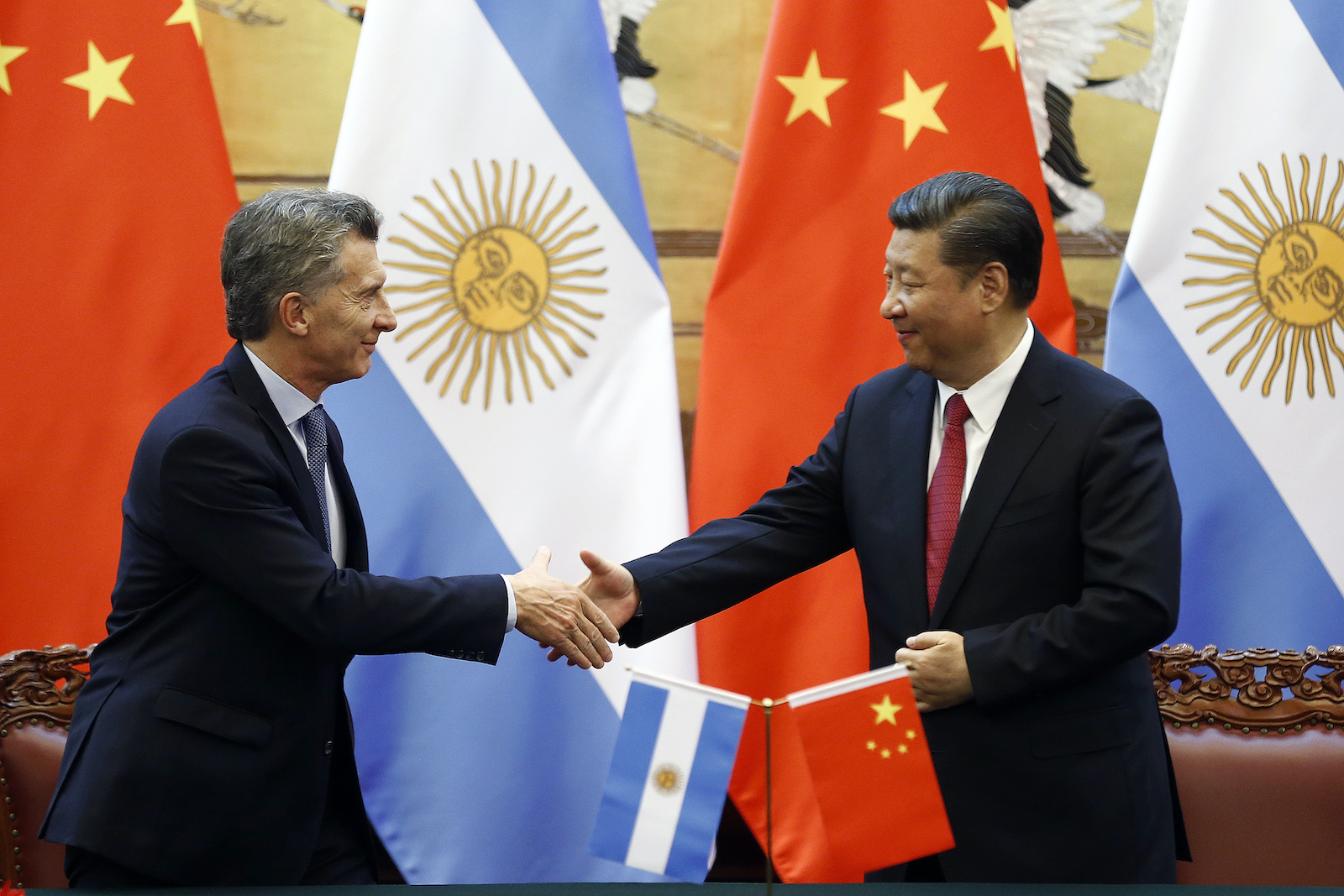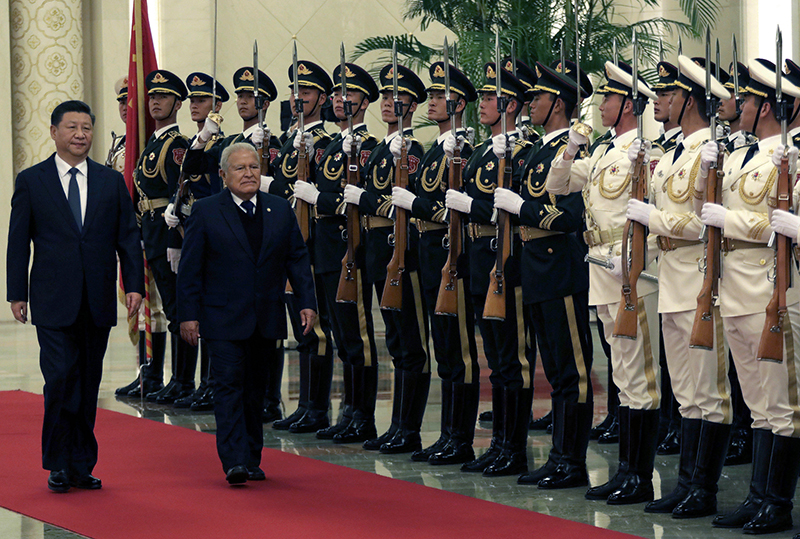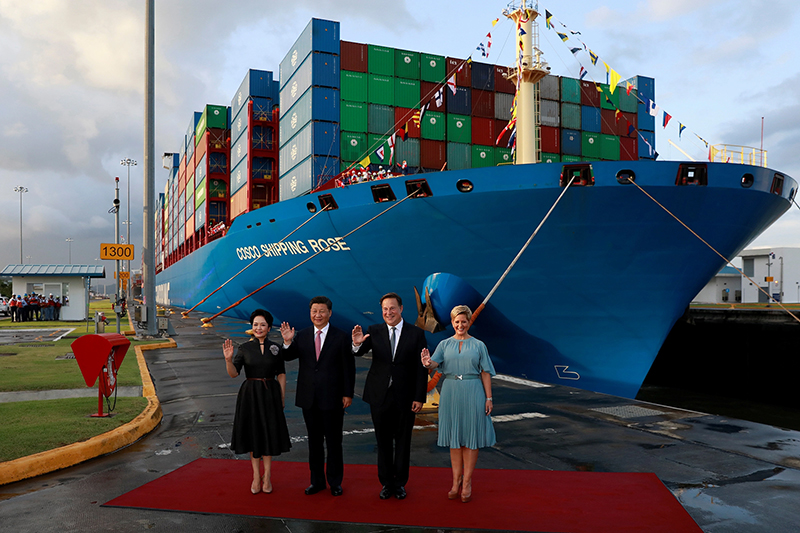The United States faces increasing difficulty in keeping pace with growing Chinese security challenges emanating from Latin America.
Over the course of the last twenty years, China has strengthened its economic relationships with countries throughout Latin America, but it is the expanding influence of China in the region that is causing increased concern in Washington.
As Beijing’s influence continues to rise around the world, American lawmakers and defense officials are closely monitoring emerging developments and assessing the potential threat to the U.S.

Photo: Damir Sagolj/Pool/Getty Images
China’s growing presence in the southern hemisphere has prompted heightened attention from U.S. defense officials and lawmakers, such as Republican Representative María Elvira Salazar of Florida, who recently brought to light the escalating security challenges originating from Latin America.
Salazar, a Florida congresswoman, raised concerns in a House Foreign Affairs Committee hearing about China’s increasing military presence in Latin America, citing Argentina, Venezuela, and Bolivia as countries that are allowing China to gain a foothold in the region.
She noted that Chinese President Xi Jinping has visited Latin America more times in the last decade than Presidents Obama, Trump, and Biden combined. “The Chinese are not here for trade.
“They’re here for war,” Salazar asserted.
They’re here for war,” Salazar asserted, pointing to China’s sales of military equipment and arms to the region. She also claimed that Argentina is considering opening a Chinese fighter jet factory. However, Argentina’s ambassador to the U.S., Jorge Arguello, called Salazar’s claims “absurd” and rejected them as false. Salazar also expressed concern about a Deep Space Station located in Argentina’s Patagonia desert, which she described as the size of “400 football fields.”

“I am sure the Chinese are very interested in studying the stars and every constellation. But the problem is that Argentina has no idea what’s going on there because the Chinese don’t let them in,” Salazar said before questioning whether this program has anything to do with the recent Chinese “balloon” activity over the U.S.
Arguello scoffed at Salazar’s concerns regarding the space station, claiming that he has personally visited it and argued that it was akin to another agreement Argentina has with the European Space Agency.
However, according to one expert on Latin America, the U.S. has serious concerns about this space station.
We have no clue what takes place there and
neither do the Argentinians
Juan Cruz, former National Security Council senior director for Western Hemisphere affairs, expressed concerns about China’s activities in Argentina’s space station, stating “We have no clue what takes place there and neither do the Argentinians. We believe that [China’s] using that as a mechanism to monitor our space activity and otherwise be a collector of intelligence.” This is just one example of China’s growing involvement in Latin America, which extends beyond its military interests in the region.
China’s economic influence in Latin America has been steadily increasing over the past two decades, with the country now having a “physical presence” in 25 out of 31 Latin American countries and almost 30% of its global lending going to the region, according to Florida Republican Rep. María Elvira Salazar’s office.
Trade between China and Latin America has also grown significantly, increasing 26-fold from $12 billion to $315 billion between 2000 and 2020, as reported by the World Economic Forum. This upward trend is expected to continue, with the trade value predicted to exceed $700 billion per year by 2035. Despite the US remaining Latin America’s biggest trading partner, China is quickly closing the gap and is poised to overtake Washington in trade, security, technology, and diplomatic relations through the use of soft power.

The U.S. has largely taken a “crisis oriented” view of Latin American foreign policy, which means they tend to pay attention to regions only after they have already become problematic or caused issues for the U.S. Meanwhile,
China has been steadily investing in the region for decades, with a “physical presence” in 25 out of 31 Latin American countries and nearly 30% of its global lending going to the region. While the U.S. remains the region’s largest trading partner, China is quickly rising to overtake Washington in nearly every field, including trade, security, tech, and diplomatic relations.
“They’re investing, and they’re having a role where no one’s looking.” Cruz said.
According to Juan Cruz, former National Security Council senior director for Western Hemisphere affairs, “Chinese investment and Chinese involvement is the opposite” of the U.S. approach. “They’re investing, and they’re having a role where no one’s looking.” China began investing in small local projects in Latin America in the late 90s and has since ramped up its investments in the region, particularly in places like the Caribbean where former colonial powers are no longer as involved.

Juan Cruz, a former National Security Council senior director for Western Hemisphere affairs, has expressed concern over China’s increasing influence in Latin America. China has a “physical presence” in 25 out of 31 Latin American countries and almost 30% of its global lending goes to the region, according to Congresswoman María Elvira Salazar’s office. Trade between China and Latin America has grown 26-fold from 2000-2020, reaching $315 billion, according to the World Economic Forum. While the US remains Latin America’s largest trading partner, China is quickly rising to overtake Washington in almost every field, including trade, security, tech, and diplomatic relations – largely through soft power.
Cruz explained that China first started investing in small local projects throughout Latin America in the late 90s and ramped up its investments in places like the Caribbean in the early 2000s. American businesses have largely left Latin America for a variety of reasons relating to corruption, legal parameters, and other foreign financial incentives. However, under China’s Belt and Road Initiative, Chinese companies have not only not been deterred by the same hurdles, but they have chosen to invest in projects that do not show obvious or even immediate gains. Cruz detailed that “No one makes money off a public utility – that’s why they’re selling them. But the Chinese are buying,” adding that “what’s that get them? It gets noticed. It gets influence.”
China’s acquisition of public utility services in Latin America, such as water, electric, and internet facilities, not only grants the country influence but also serves as a bargaining chip, according to Juan Cruz, former National Security Council senior director for Western Hemisphere affairs.

Cruz explained that China’s investment in these public infrastructure projects not only buys them favor in the region but also opens up a certain amount of control. He also noted that China is buying agreements that don’t necessarily make money, but they provide the country with influence that cannot be tabulated.
While defense officials have previously warned about the intelligence China could be collecting through its Huawei infrastructure, Cruz highlighted the additional advantages that come with acquiring public utility services.
Juan Cruz, former National Security Council senior director for Western Hemisphere affairs, warns that the Chinese are investing and having a role where no one is looking. Under China’s Belt and Road Initiative, Chinese companies have not only not been deterred by hurdles like corruption and legal parameters, but they have also chosen to invest in projects that do not show obvious or even immediate gains. These investments in public infrastructure and technology development not only buy China favor in the region, but they also open the door to a certain amount of control.
Cruz explains that the influence China appears to be buying in Latin America has security officials concerned on many fronts, including the acquisition of natural resources, 5G development, space security, and major geopolitical hot topics like the security of Taiwan. “The Chinese playbook is not just one. They have tool after tool after tool that they’re employing,” Cruz said, explaining that it is becoming near impossible to counter China in every sector they are involved in. “They’ve opened 10 fronts against us. Do we fight on all 10 fronts? Can it be done? I don’t know.”



